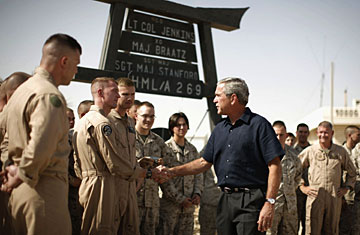
President George W. Bush, center, greets troops at the al-Asad air base in Anbar Province on Monday, Sept. 3, during an unannounced visit to Iraq to meet with General David Petraeus
Every day President Bush gets briefings on Iraq from his advisors. He gets intelligence reports first thing in the morning from his Director of National Intelligence. He gets updates from his National Security Advisor Stephen Hadley and his Iraq czar Gen. Douglas Lute. He even gets a nightly three- to four-page memo on Iraq from his staff at the National Security Council.
Monday, during his surprise visit to the al Asad air base in Iraq's Anbar province, Bush got a different kind of briefing from Capt. Lee Hemming, a Marine helicopter pilot in Anbar.
In a cement building sheltering them from the 110-degree heat outside, Hemming stood in a flight suit in front of Bush and a roomful of Marines. The captain was nervous, careful and spoke very much as if he had spent a lot of time memorizing what he was going to say. Holding a long metal pointer up to a wall map, he told Bush what his unit's mission is and what they've seen in their area of operations. Bush followed along, nodding, and for a while it looked as if the event would turn out to be the usual dog-and-pony show the Defense Department puts on for VIPs.
But then Hemming began to talk about the Marines' new rotation schedule, and their extended tours in Iraq, and the room became more tense. Hemming said there were pros and cons to the rotation. The pros, he said, were that Marines could familiarize themselves with the battlefield thanks to the extra days they serve on it. The cons stemmed from the length of the troops' five-month stateside break between deployments. Speaking more quickly out of what seemed nervous determination, Hemming said, "Our training at home has been very limited." The short stays were particularly hard on families, he said.
As the room waited to see how the President would react, Hemming said he would welcome any questions or comments. Bush looked across the room at him and said, "Morale. How's morale?" "It's very good sir," said Hemming.
Bush came to Iraq to thank the troops and to see for himself what progress they are making against the insurgency. During his seven hours on the ground, he was greeted respectfully, sometimes enthusiastically. By most accounts morale is indeed high, particularly in Anbar province, where victories over Al Qaeda in the past year have buoyed the spirits of soliders on the ground. But as Bush's briefing at al Asad air base indicated, the armed forces have limits on how long and hard they can fight.
Bush also met Monday the two men who will make a key recommendation to Congress this month on the future of the mission in Iraq, Gen. David Petraeus and Ambassador Ryan Crocker. Bush said the two men told him that "If the security situation continues to improve the way it has we may be able to achieve the same objectives with fewer troops." Earlier, he told Marines, "When we begin to draw down troops in Iraq it will be from a position of strength and success, not from a position of fear and failure."
Just what that means for Capt. Hemming remains to be seen. As he departed Iraq, en route to a quick refueling stop on the island of Diego Garcia before continuing on to the Asia-Pacific Economic Cooperation forum in Sydney, Bush brought a small group of reporters up to the conference room at the head of the Air Force One. Its long, oval table, white wall-to-wall carpeting and large flat-screen TV were the converse of the dusty, bare camp the President had just left. I asked him if any service members other than Hemming had raised concerns about the rotation schedule and deployments to Iraq. He said, "One guy, you know, went out of his way to let me know that his young baby was there [in the U.S.]. He was concerned about his child. But on the other hand, he said, 'Mr. President, I'm looking forward to the mission I'm going on because we're making progress.'"
Bush said, "Obviously there's concerns about families, rotations. People who have got young kids want to be with their kids. I understand that. On the other hand, many of them reup," he said, arguing that reenlistment rates are high in Anbar. Would service members' concerns affect his decision about troop levels later this month? "The main factor that will affect my decision on troop levels is, can we succeed, what does it take to succeed?" Bush answered. "Because failure would lead to harm to America, is what I believe. As a matter of fact I'm certain of it."
